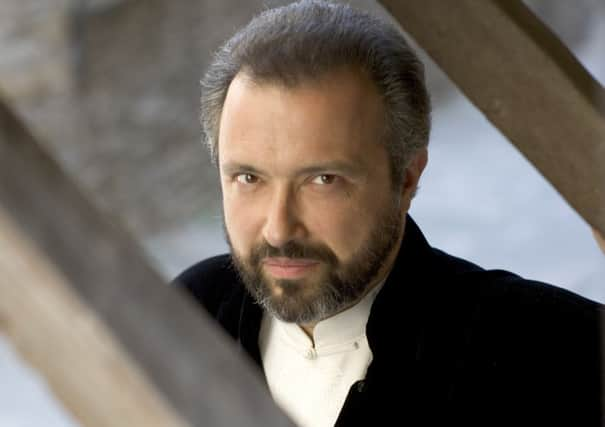Russian violinist who was born to play


Dmitry Sitkovetsky defies categorisation – a violinist, conductor, arranger and festival director. This great artist is known not only for his strong, bold playing and immaculate technique, but for his considerable subtlety.
Playing a rare violin that’s almost 300 years-old, Dmitry Sitkovetsky’s return to Harrogate after 25 years offers a priceless opportunity to see the Russian master in action on March 30. “It’s been my faithful companion for more than 30 years,” says Sitkovetsky, speaking from New York. “I probably spend more time with the violin than my own family”
Advertisement
Hide AdAdvertisement
Hide AdThe Stradivarius violin is valued in the millions. Built in 1717, it’s fitting that Sitkovetsky cherishes an instrument that speaks such musical heritage. A fourth-generation violinist born into Russia’s music aristocracy, his mother is the pianist Bella Davidovich, his father Julian, was also a violinist destined for greatness before dying of cancer aged just 33.
Sitkovetsky’s own life story matches that of any great Russian novel. Growing up in communist Moscow, at aged 22, he faked tendonitis to escape the regime.
“You have to know what the regime was like in ’77,” he says. “It was not possible to emigrate. I had two possibilities, to compete internationally and then defect, but that would have affected my mother, it would have been the end of her, she’d be the mother of a criminal. It was not an option. The other possibility was hard and risky because in order to emigrate I had to convince the authorities I was no longer a valuable asset to them. Soviets gave the best music education, it was unmatched, so they wanted a return on their investment.”
Leaving was considered ‘treason’.
“I convinced them I could no longer play the violin. I went to hospital and got the doctors to say I had tendonitis and couldn’t play, I cancelled all concerts, and six months later I applied to leave. It was a long and risky plan which worked. I beat the regime. I came to New York with nothing, not even my violin.”
It was a risk he was determined to take.
Advertisement
Hide AdAdvertisement
Hide Ad“Objectively, everything was decided for me, my path was the path of my parents. If I was going to go along with those rules, I would have been one of Russia’s most well-known violinists, but knowing I’d always be controlled by the government and be a glorified slave,” he says.
As well as the principle of art not being defined by politics, his need to escape was deeply personal.
“Ever since I can remember, I was unsure how much credit I was getting. I thought it was all because of my parents and I wanted to know what I was capable of, on my own. In America, no-one had heard of my mother. I started from Ground Zero, that was my wish.”
New York in the late 1970s was artistically vibrant.
“At that time it was unsafe, but incredibly liberating. New York then was as much my time as Rockefeller’s. I never felt a stranger in New York or a foreigner. It embraced me as it did thousands of others.”
While in the city he attended the famous Juilliard School.
Advertisement
Hide AdAdvertisement
Hide Ad“It was a great place to be, full of fantastic talents, people from all over the world. From a musical point of view, my great discovery was chamber music, it was booming in the States. In Russia in the 70s a lot of scores were limited, but in New York City at the Lincoln County Library, there it all was!”
Night life revolved around theatre, as Robin Williams and Christopher Reeves were contemporaries at Julliard.
“Every evening I’d go to the theatre and watch Shakespeare plays. There was the New York Philharmonic, the ballet was fabulous, it was glorious.”
Sitkovetsky now lives in London with his wife, a former opera singer and now a voice teacher. His daughter is also an opera singer.
Advertisement
Hide AdAdvertisement
Hide Ad“Music stays in the family,” he laughs. “It’s difficult, it’s in the gene pool and incredibly strong, you either give in to it or totally reject it altogether.”
The correlation between Russia and great artistry is also in the genes.
“The reason why so many Russian Jews became performers was it was the only way they could become someone, to get out of their low places. The Revolution in 1917 gave them a chance to become important members of society, but before that music offered a social element, to fight for your place in life.
“Now it’s different, there’s still a strong tradition but not to such a degree as before, now Russians can travel, pursue other interests or professions. What they did have was the best system of education during communism. Stalin realised one very important truth by having his geniuses in music – he could conquer the West without a single shot being fired through art. Everywhere the Bolshoi Ballet went, for example, they dominated the 20th century. It was part of culture and propaganda.”
Advertisement
Hide AdAdvertisement
Hide AdThe music in his DNA ensures audiences can expect a recital that’s rather special.
“Today, recitals are often sonata affairs,” Dmitry said. “This is not what the violin recital was, or should be. I like a theme going through the programme, partly its homage to Fitz Kreisler.
“There’s much more variation in my programme, showing the different colours and skills of the violin. Today, programmes are standard and kind of boring. In Harrogate, the audience can take a real trip to different cultures, countries and styles.”
• Harrogate International Festivals’ Spring Series presents Dmitry Sitkovetsky, The Old Swan Hotel, Sunday 30 March at 11am. For more information or to book tickets, visit www.harrogateinternationalfestivals.com or call 01423 562303. book or more info: http://harrogateinternationalfestivals.com Box Office 01423 562 303. Tickets £15.50; £17.